What is a Crypto Wallet?
Although we talk about cryptocurrency as if it's the same as your usual bank assets, crypto is unique in how it works. At their core, crypto wallets are the means to store private keys, which provide ownership and enable transactions within the blockchain network. Private keys are cryptographic codes that serve as digital signatures, allowing users to prove ownership of their digital assets and authorize transactions.
A crypto wallet acts as a secure repository for these private keys. It not only stores the keys but also provides a user-friendly interface for managing and interacting with various cryptocurrencies. Think of a crypto wallet as a virtual wallet that allows users to access, send, receive, and monitor their digital currencies.
It's important to note that while crypto wallets facilitate the storage and management of private keys, they do not actually "hold" or store the cryptocurrencies themselves. The digital assets remain on the blockchain, and the wallet merely provides access to them through the private keys.
With these keys, the wallet allows you to:
-
First, it allows you to prove ownership of the digital currency
-
Secondly, the crypto wallet makes buying, selling, and trading cryptocurrency simple and easy for the user.
-
Lastly, it will enable you to easily access multiple crypto casinos, take advantage of their different offerings without having to leave your stash in the casino's hot wallet for long, eventually becoming a liability.
Types of Crypto Wallets
There are various types of wallets. Each has its own purpose and caters to specific audiences. The wallers can vary from online apps to a piece of paper with a QR Code. Let's break down some basic types of wallets.
Paper Wallets
Paper wallets consist in printing the private keys on paper, providing offline storage for enhanced security.
Bitaddress.org
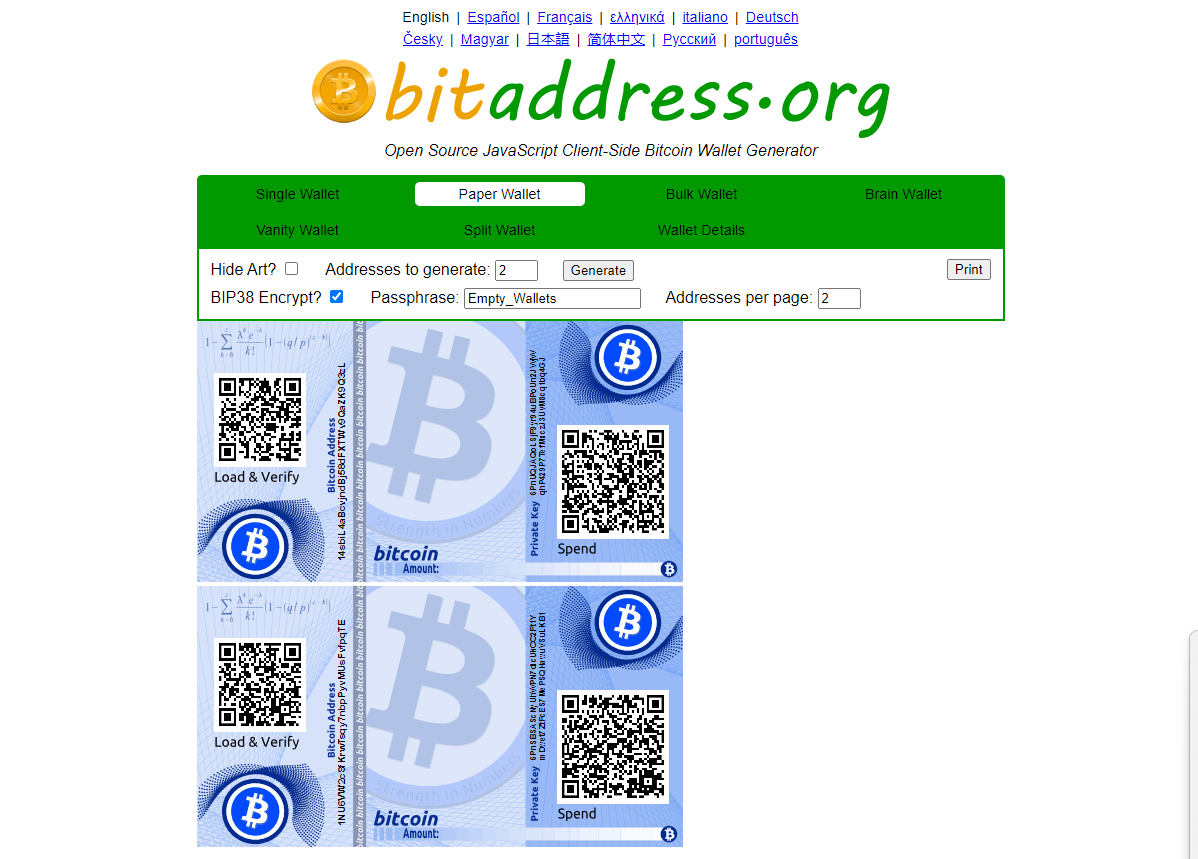
Bitaddress.org was originally launched anonymously in 2011 and is a trusted tool for generating secure Bitcoin paper wallets. The process is straightforward, access the website and disconnect your device from the internet (don’t worry the site will still work without connection), move your mouse around (this provides a random user input used for the wallet generation) until your wallet is generated and you'll receive a new Bitcoin address along with its corresponding private key. Print the wallet details, ensuring the printer is not connected to the internet and making sure to clear its cache after, and store it safely.
The user-friendly interface features also optional security layers like BIP38 encryption provide extra protection (essentially adds a password to access the private key), Vanity wallets that allow you to customize the initial characters of your address, Split wallets also known as multi-signature wallets, or a Brain wallet meaning the addresses are generated by the input of a seed phrase the user chooses and inputs in the key generator.
Software Wallets
Software wallets are digital wallets that run as applications on your computer or smartphone. They’re designed for ease of use and provide quick access to your crypto assets, making them perfect for everyday transactions and interacting with Web3 services like DeFi platforms and crypto gambling sites. Because these wallets are connected to the internet, they’re often referred to as hot wallets. However, when used in combination with a hardware wallet for signing transactions, they can offer a much higher level of security—essentially turning a hot wallet into a secure interface for managing funds.
To get started, you’ll need to import or create a wallet, then securely back up your 12- or 24-word seed phrase. Never share this phrase, and always store it offline. With the right precautions, software wallets strike a great balance between convenience and security.
Here are some of the most popular software wallets available today:
Xverse
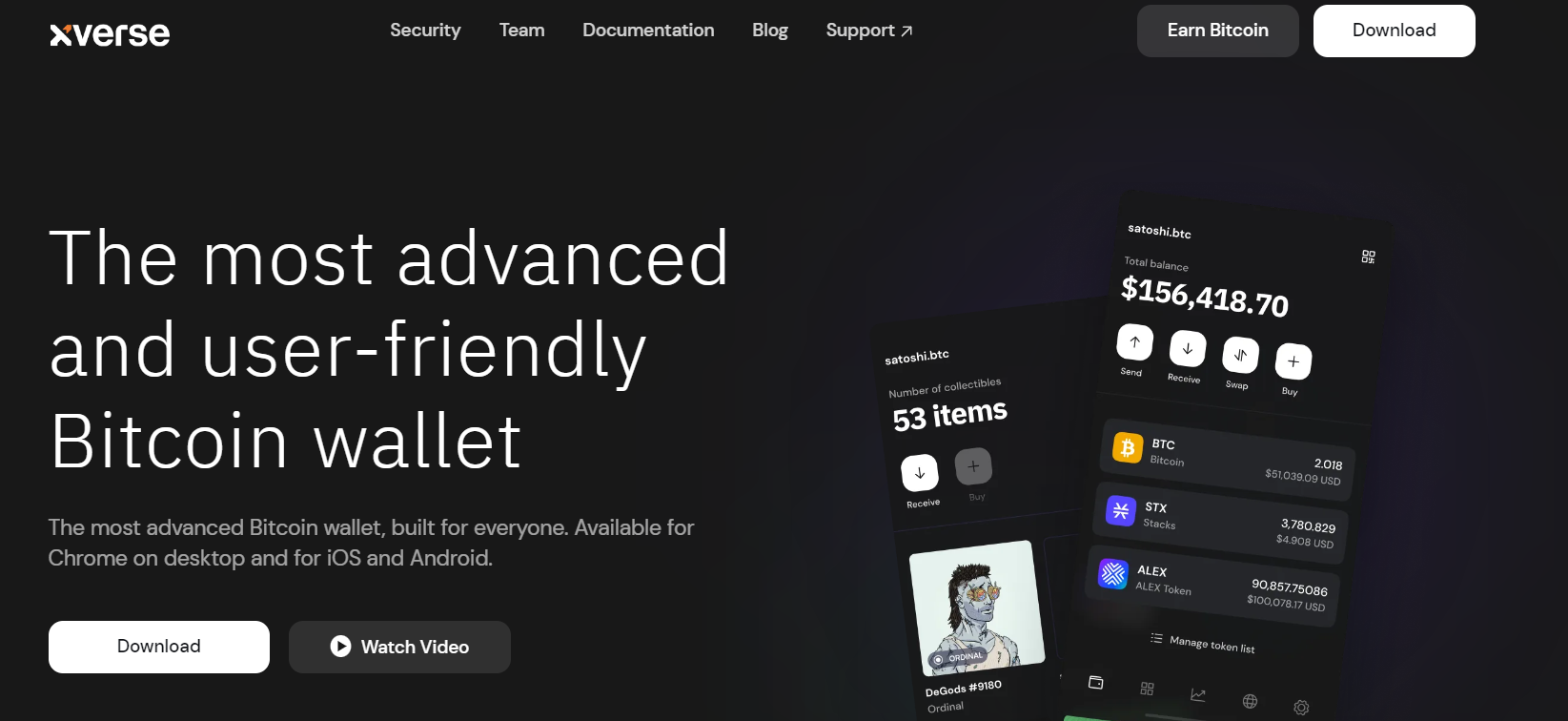
Xverse is a Hot Wallet for Bitcoin that also supports Ordinals (the equivalents of NFT’s on the Bitcoin blockchain) and Stacks (a smart contract layer 2 for Bitcoin). Xverse also will let you stake your Stacks (STX) to earn rewards in the form of Bitcoin, and interact with dapps of the Stack ecosystem.
ZenGo
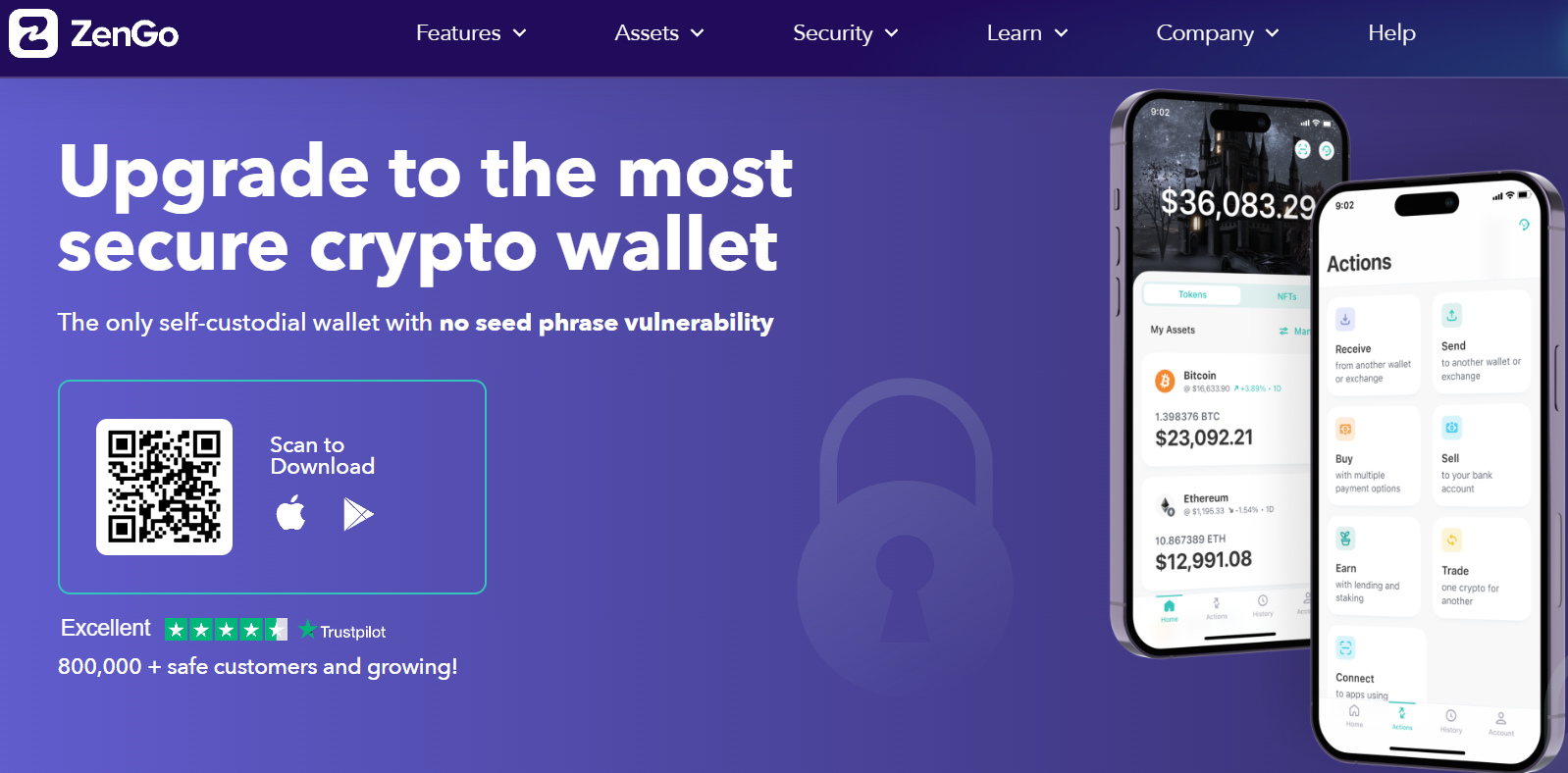
ZenGo is a widely supported hot wallet in the form of a mobile app. The wallet is extremely user-friendly and is one of the few crypto platforms that doesn't require KYC. The wallet includes a few additional features, such as buying and selling crypto within the dApp.
Zengo makes security a priority and includes security features such as 3-factor Authentication, Biometric Encryption, MPC Encryption, and more. This is the best crypto wallet for online gambling, short-term trading, and remaining secure.
PINT Wallet

PINT wallet is the best on-the-go crypto wallet with top-tier features available through your mobile. The wallet only supports a few cryptocurrencies, but the wallet has a focus on Anonymity and user security which is why they allow users to use features such as its P2P marketplace, encrypted chats for Buyers and Sellers, in-wallet exchanges, and even escrow payments. Users can even remove their private keys to store in paper wallets or move them to hardware wallets.
The wallet is fast and easy to set up and provides its users with rewards as they use the platform. Overall it's easily one of the best crypto wallets.
MetaMask
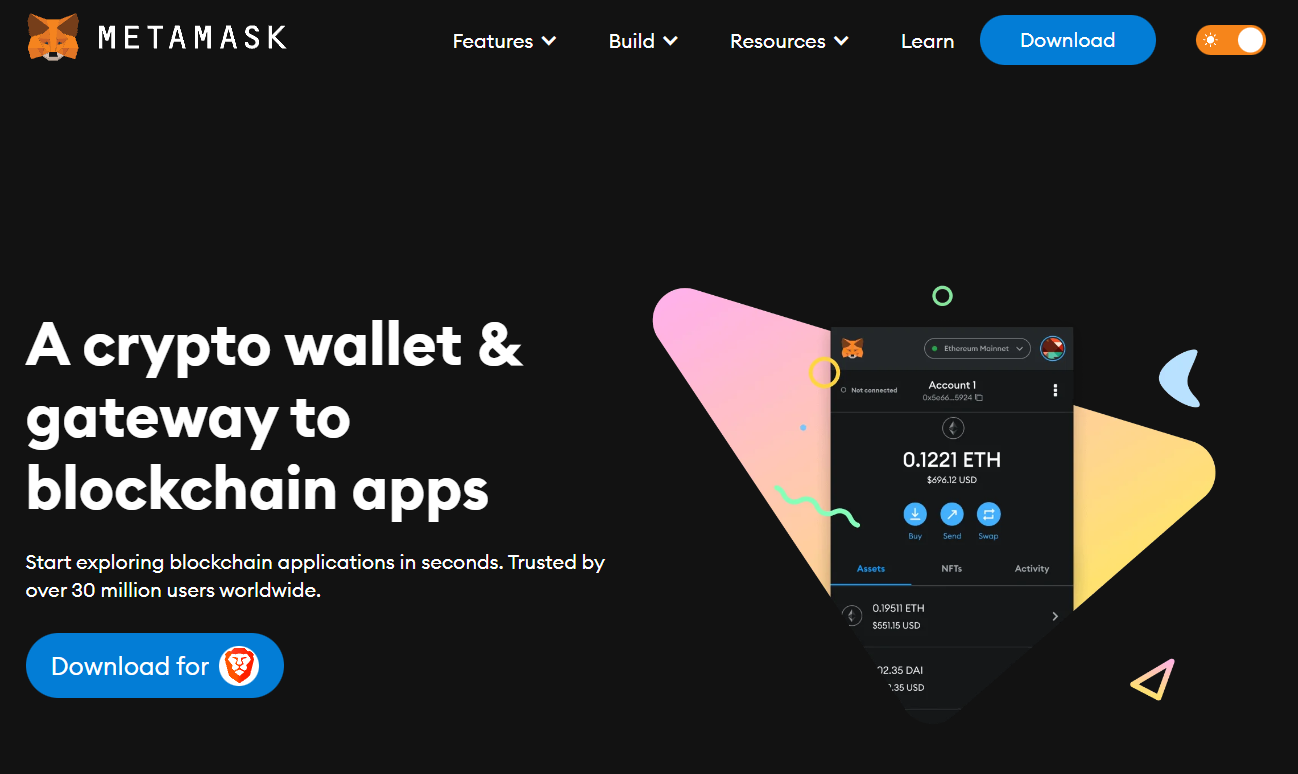
MetaMask is easily one of the most popular crypto wallets. They have plugins on multiple casinos and crypto platforms to make things easier for the users. The platform is anonymous, doesn't require any KYC, and doesn't store any user data. You don't even need an email to set up an account.
They include a few features, such as NFT support, multiple wallet addresses, and swapping of currencies. They have great live chat customer service and are supported by 21 million active users.
Phantom Wallet
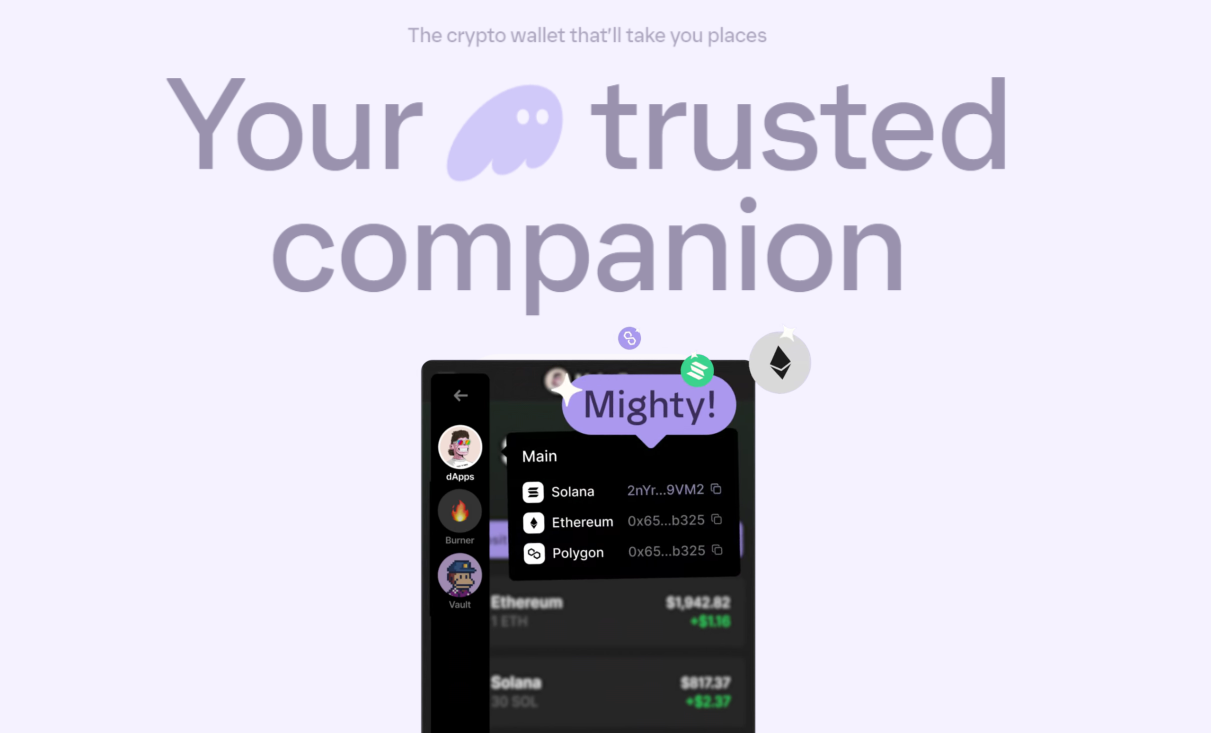
If you are a NFT geek or simply wish to transact on the Solana, Polygon or Ethereum network, Phantom is one of the most popular non-custodial Mobile wallets for it. Aside from the basic functionalities every wallet provides, Phantom also claims to provide Scam detection flags to warn against malicious transactions; remember it’s your responsibility to know what you are signing when interacting with a smart contract.
-
Warning: If you are going to start transacting on the Solana blockchain it is important to be aware of one the most common scams there is: At some point in time you will receive
-
Mystery Box NFT’s named after real crypto projects. The NFT's description will direct you to a website that looks just identical to the official project. The site will then ask you to claim the reward by minting your NFT through a smart contract that your wallet will prompt you to sign. The transaction asks in plain English if you want to send all your assets to another address? Most people would reject it or close the site but lots of people, caught up in the excitement of the promised reward, sign it without reading and end up losing everything in their wallet: Always read carefully any transaction and double check addresses.
-
Earn Solana by burning scam NFT’s: Now that you are aware of these types of scams, the good news is that you can earn a small amount of Solana by burning these scam mystery box NFT’s. Here’s a 1 min video on how to do it:
Trust Wallet
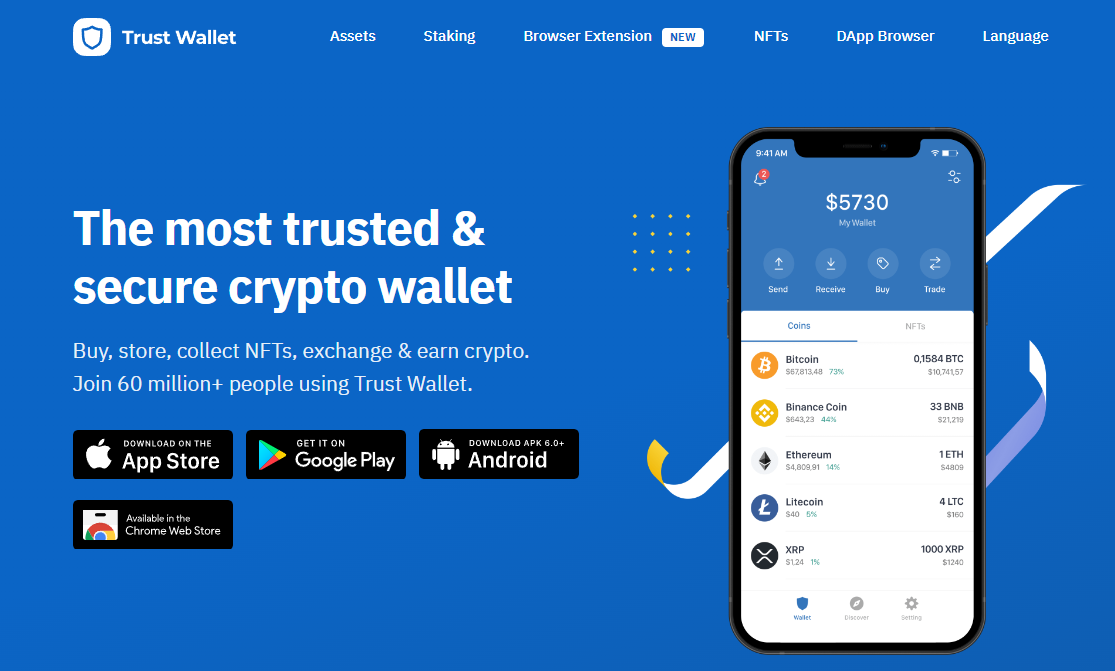
If you are looking to simplify your life and have a single wallet to handle all your assets in different networks, Trust Wallet is probably one of the best alternatives. Surprisingly, the wallet supports 100 blockchains and +9 million assets (I didn’t know there were so many either).
Perhaps it’s worth pointing out that having all your eggs in one basket is not the best idea. It’s advisable to have your funds spread between devices or wallets, to limit the downside of an accident, loss, or even an armed robbery.
Sparrow Wallet
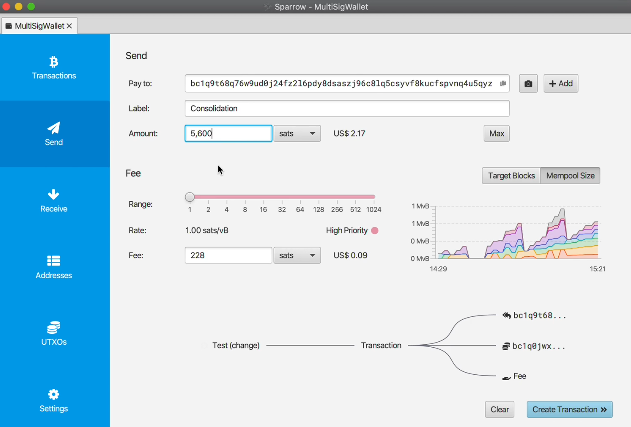
Sparrow Wallet is an anonymous Bitcoin wallet that stands out for its advanced functionalities, providing more control over Bitcoin transactions. One of its key features is the ability to manage UTXOs (Unspent Transaction Outputs), giving users the power to consolidate multiple UTXOs, time-lock UTXOs for future spending, and batch multiple output UTXO transactions into a single transaction. This level of granular control enhances transaction efficiency and allows users to better manage fees.
For those seeking a higher level of security, Sparrow Wallet is also compatible with various hardware wallets, allowing users to keep their private keys offline while benefiting from Sparrow's advanced functionalities.
Additionally, Sparrow Wallet supports Tor connectivity, which increases user privacy by routing transactions through the Tor network, making it an ideal choice for those looking for an anonymous wallet solution.
Exodus Wallet
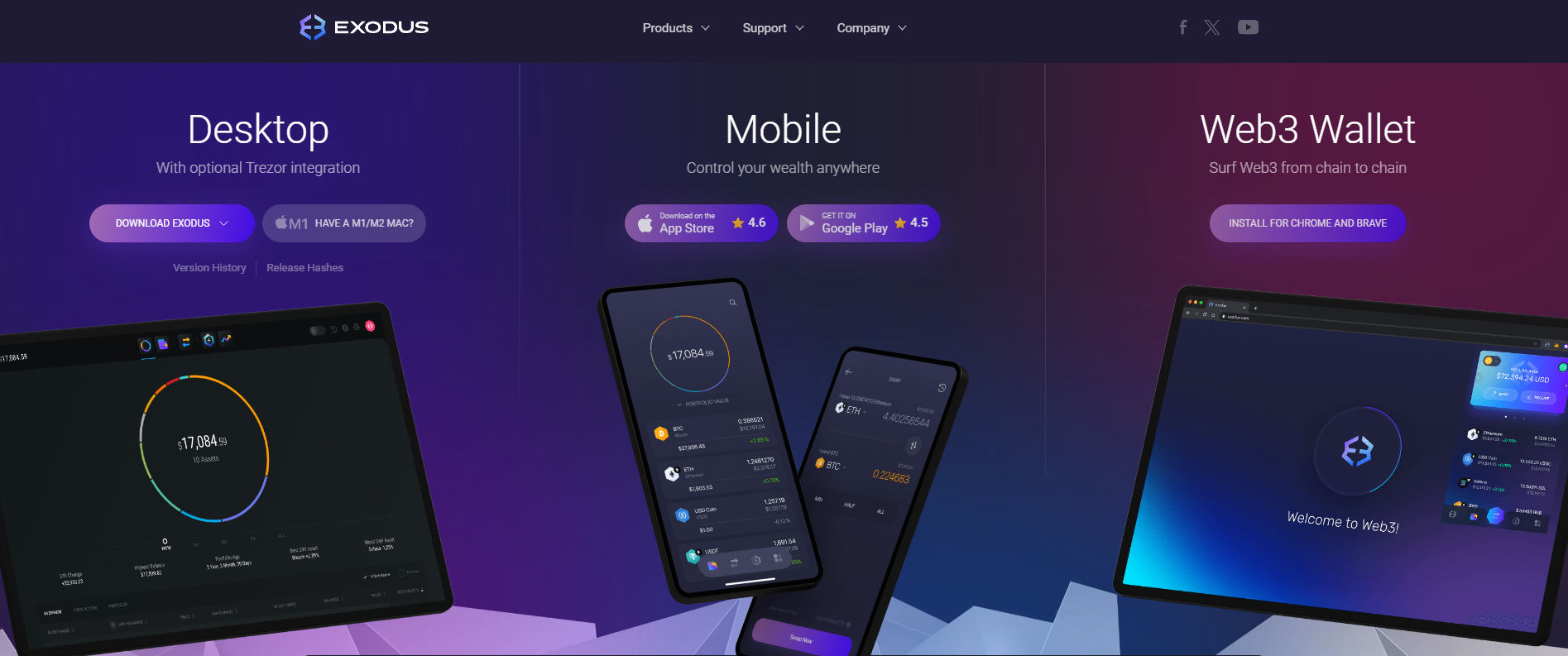
Exodus is a top rated wallet and the slickest alternative for desktop, mobile and as a browser extension. It supports over a thousand assets across +50 blockchains. Users can easily track coin performance with live charts, swap coins, manage their NFT’s and even reach out to a 24/7 customer support. The only inconvenience is that it’s only compatible with Trezor hardware wallets, so either run it without a hardware wallet or get yourself a brand new Trezor.
Cake|Bitcoin & Monero Wallet
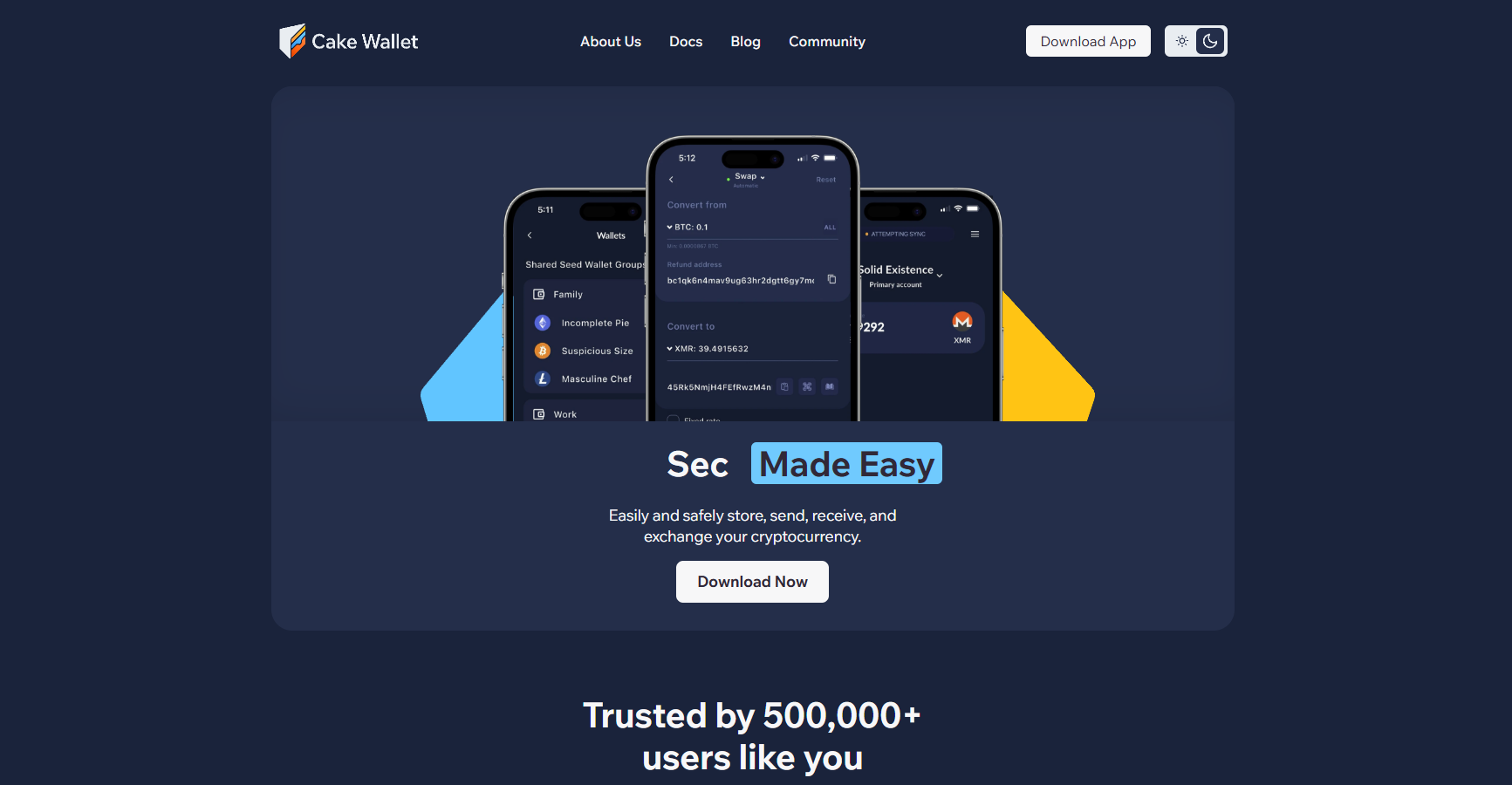
Cake Wallet is a user-friendly, open-source, self-custodial wallet that supports Monero (XMR), Bitcoin (BTC), and Litecoin (LTC) on the desktop, with additional support for Ethereum (ETH) on the mobile version. The wallet's integration with services like ChangeNOW for in-app exchanges and Bitrefill for purchasing gift cards enhances user convenience.
Available for both iOS and Android, Cake Wallet is one of the three Bitcoin wallets that have enabled Silent Payments, which automatically generate new addresses for each BTC transfer, enhancing privacy and security for users.
Aqua Wallet

Aqua Wallet is a user-friendly, open-source, self-custodial wallet designed for Bitcoin, the Lightning Network, and Liquid assets including Tether USDt. It offers a simple and intuitive interface for managing your Bitcoin and Liquid assets, enabling seamless transactions with ultra-low fees and cross-chain transfers through Sideswap and Sideshift integration.
These integrations allow users to receive USDT (Ethereum & Tron) that gets automatically converted to L-USDT (USDT on the Liquid Sidechain) and to send USDT to the ETH or TRX Blockchain without needing these blockchains' native tokens to pay for gas fees. Similarly, incoming Bitcoin Lightning is converted to LBTC (Liquid Bitcoin), which can be sent to a Lightning address when needed.
Available for both iOS and Android, Aqua Wallet focuses on financial empowerment, allowing users to custody Bitcoin on the mainnet, stack sats on Liquid Bitcoin to avoid the high fees of the mainnet, and send and receive USDt without the need for additional altcoins for gas fees.
Wasabi Wallet|Privacy-First Bitcoin Wallet

Wasabi Wallet is a Bitcoin-only, non-custodial wallet designed with a primary focus on user privacy. Leveraging advanced privacy tools like CoinJoin technology, Wasabi Wallet ensures your Bitcoin transactions are harder to trace, offering unparalleled security for individuals prioritizing anonymity.
Key Features:
-
CoinJoin Protocol: Enables users to pool their Bitcoin with others, making it nearly impossible to trace the origins of transactions.
-
Tor Network Integration: Routes all communication through the Tor network for enhanced anonymity and resistance against tracking.
-
Open Source: Fully transparent codebase audited by the community, ensuring security and trust.
-
Advanced UTXO Management: Provides granular control over coin selection, allowing users to segregate tainted coins from clean ones.
The wallet is available for desktop platforms, including Windows, macOS, and Linux, and continues to be a leading choice for Bitcoin enthusiasts and privacy advocates.
Nunchuk Wallet|Advanced Multisig Bitcoin Wallet
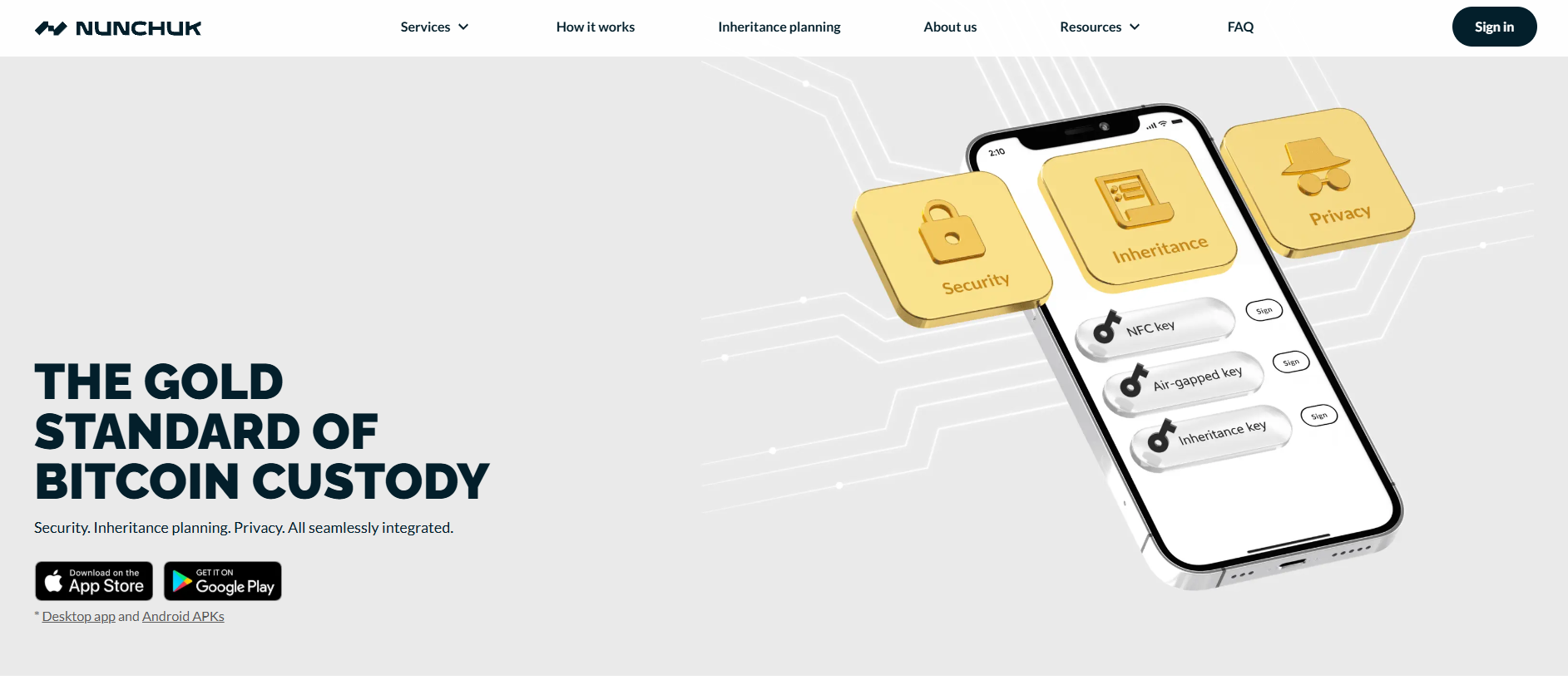
Nunchuk Wallet is a powerful, non-custodial Bitcoin wallet built for users who demand robust security and collaborative custody solutions. Designed with advanced features like multisig vaults and time-locked transactions, it empowers individuals, families, and organizations to manage Bitcoin with confidence and precision.
-
Key Features: Multisig Vaults: Create collaborative wallets that require multiple signers, ideal for inheritance planning, team treasury management, or enhanced personal security.
-
Hardware Wallet Integration: Pair with popular hardware wallets for secure transaction signing, minimizing online attack vectors.
-
No KYC Required: Full access without registration or identity verification, making it a trusted choice for those seeking an anonymous wallet.
-
Collaborative Custody: Invite co-signers to your wallet setup, with flexible policy management.
-
Inheritance Planning: Set up secure fallback mechanisms in case of emergency or loss.
Nunchuk is available for desktop and mobile, and stands out as one of the top crypto wallets for serious Bitcoin users prioritizing security and sovereignty.
Hardware Wallets/Cold Wallets
Hardware wallets are devices designed to securely store your private keys and manage cryptocurrencies. In principle these devices provide an offline, cold storage solution that enhances the security of digital assets by keeping the private keys offline and isolated from online threats.
These devices typically feature a small screen and physical buttons for user interaction, which allows users to verify and confirm transaction details directly on the device. Similar to Hot Wallets, these devices will also generate or require a 12 or 24 seed phrase which can be used to import or open your wallet in a different device, in case the previous one is lost or damaged.
Another extra security feature of some of the hardware wallets is that they are air gapped, meaning they are not connected to the internet in any way. All interaction is done through QR codes and even if there was a malicious URL link embedded in the QR code, the device wouldn’t be able to open it since it has no access to the internet.
Ellipal Titan
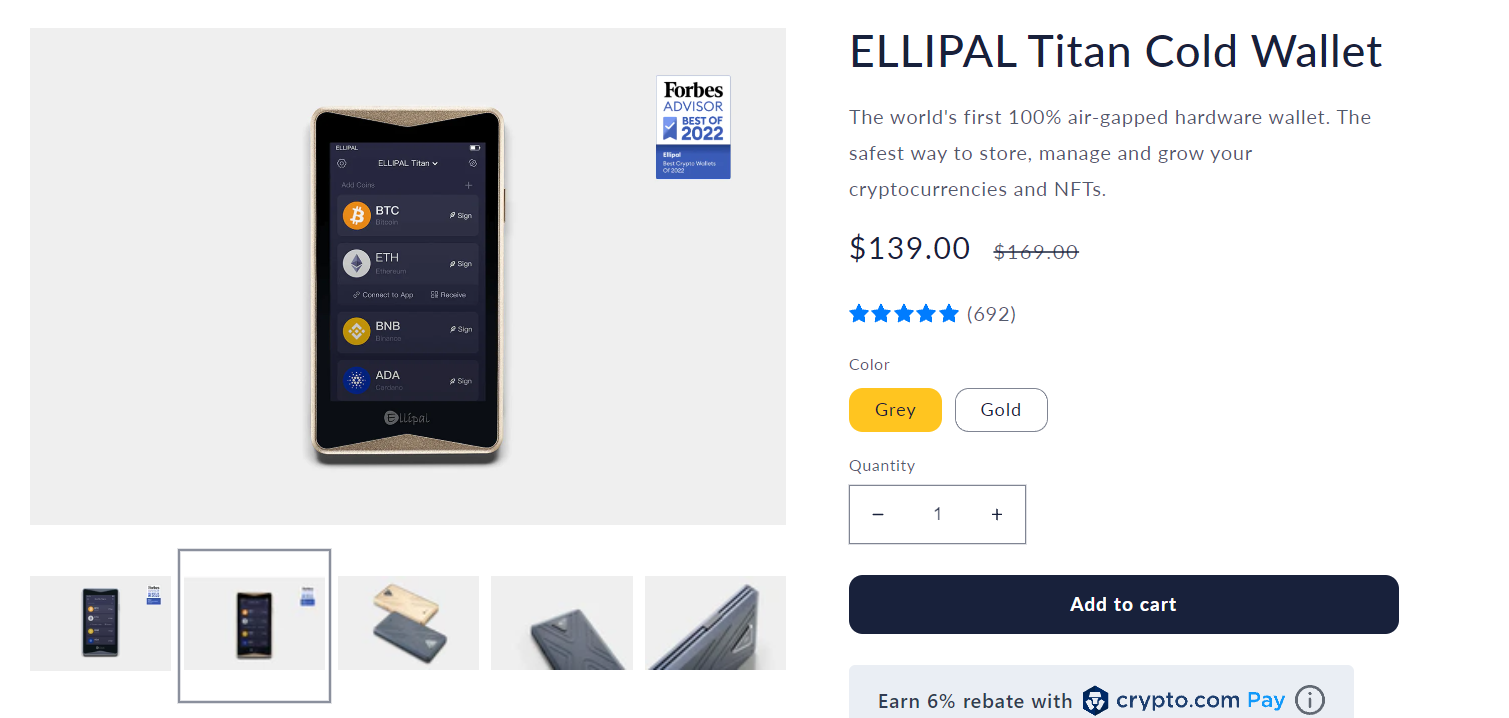
The Ellipal Titan and the Ellipal Mini are air-gapped hardware wallets that operate without the need for a direct internet connection, to avoid potential risks. The device has a built-in camera that scans QR codes for convenient transaction verification and a disassembly proof design to secure from any type of physical tampering of the device.
Block Stream Jade
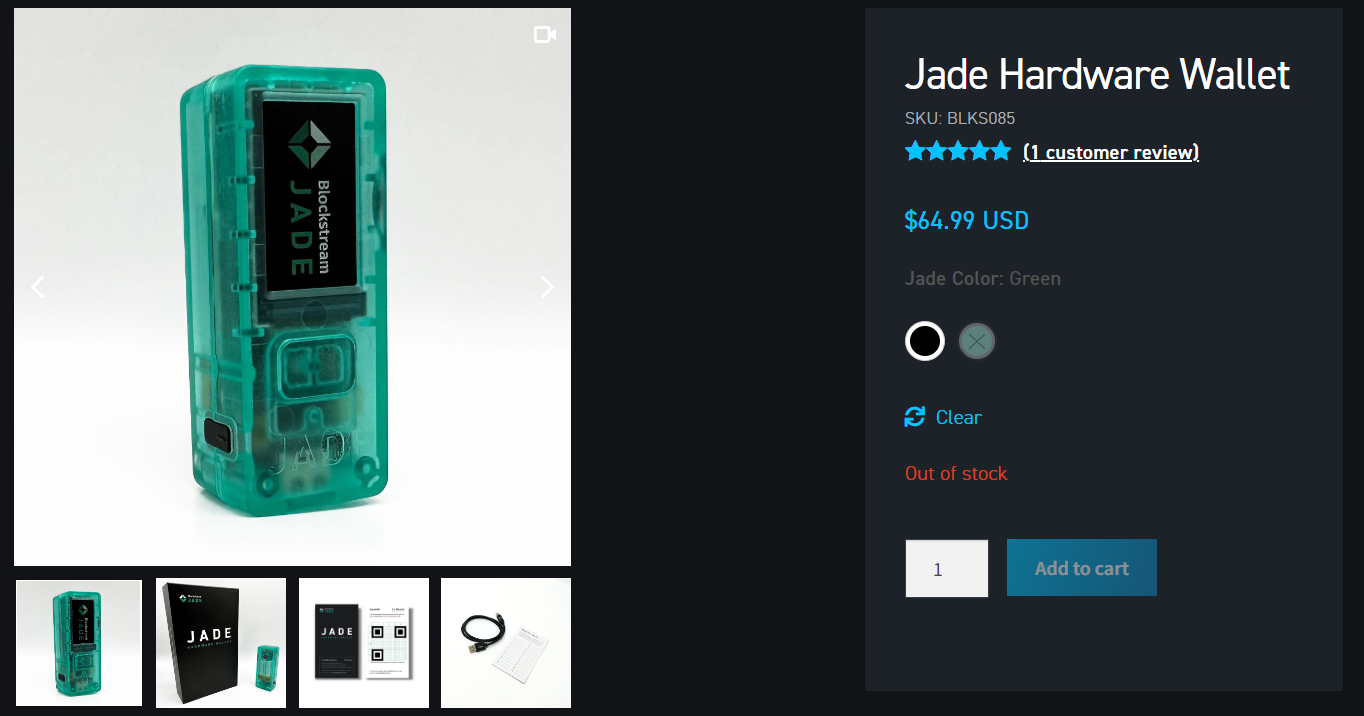
The Blockstream Jade is another air gapped device that features a camera for transactions through QR code. The wallet supports Bitcoin and Liquid (Layer 2 solutions for Bitcoin) and while it may seem like a bad purchase in terms of the number of coins supported, potential buyers should keep in mind that in this instance less is more. Blockstream is a good alternative because every coin supported by a hardware wallet is potentially a new attack vector to the security of the device.
Keystone Pro
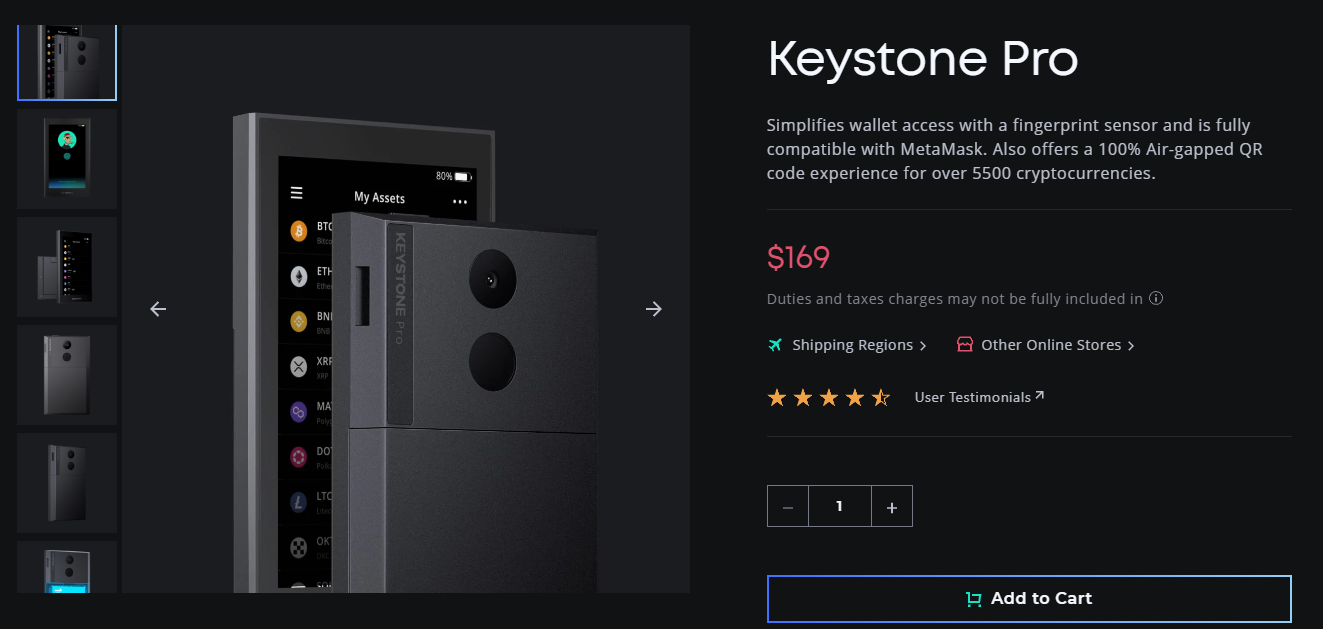
The Keystone Pro takes air gapping to the next level by removing Bluetooth connectivity and only allowing Firmware updates through a micro-SD card. Similar to other hardware wallets all interactions are done through QR codes but it also has a self-destruct mechanism. Yes, you heard that right, when the device detects disassembling of the device it will wipe out all information stored inside.
Ledger Nano S Plus
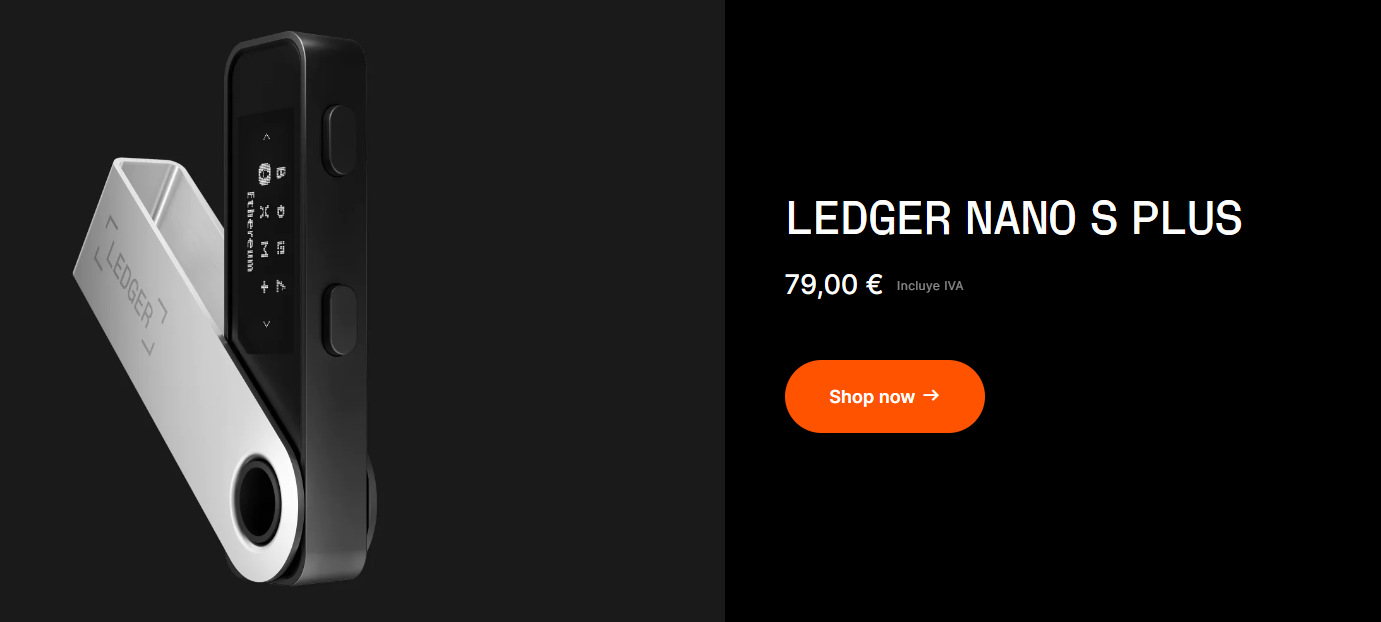
The wallet has multiple models, but the most popular is the Ledger Nano S Plus. The offline wallet gives full control to the user and can only be accessed when unlocking the device using a unique password while plugged in using the USB-C cable that the wallet comes with.
The wallet is not the most user-friendly and requires a bit of basic crypto knowledge plus additional research to make sure that you keep your funds secure and accessible. But it helps the user remain 100% anonymous using the Ledger-created proprietary operating system. The hardware wallet costs about $80, which is reasonable for its functionality when comparing it to alternative hardware wallets.
Cool Wallet Pro
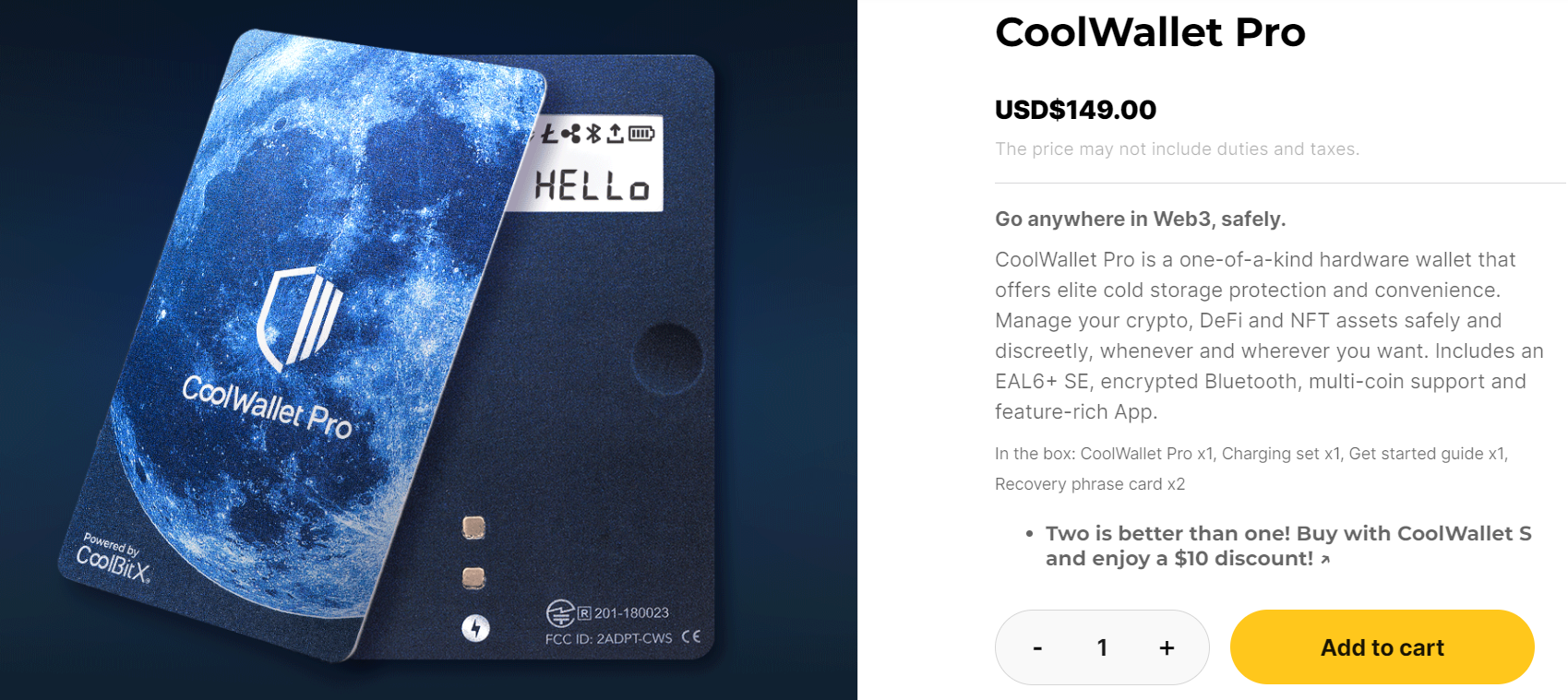
CoolWallet Pro is a credit card sized hardware wallet which has bluetooth connectivity and a battery that will last 2 to 3 months on standby. The perfect option to fit in your physical wallet and way more discreet than the bulky and quite popular competitor device. You can also buy the previous version which is $40 cheaper and still stores over 10 000 coins.
Coldcar Mk4
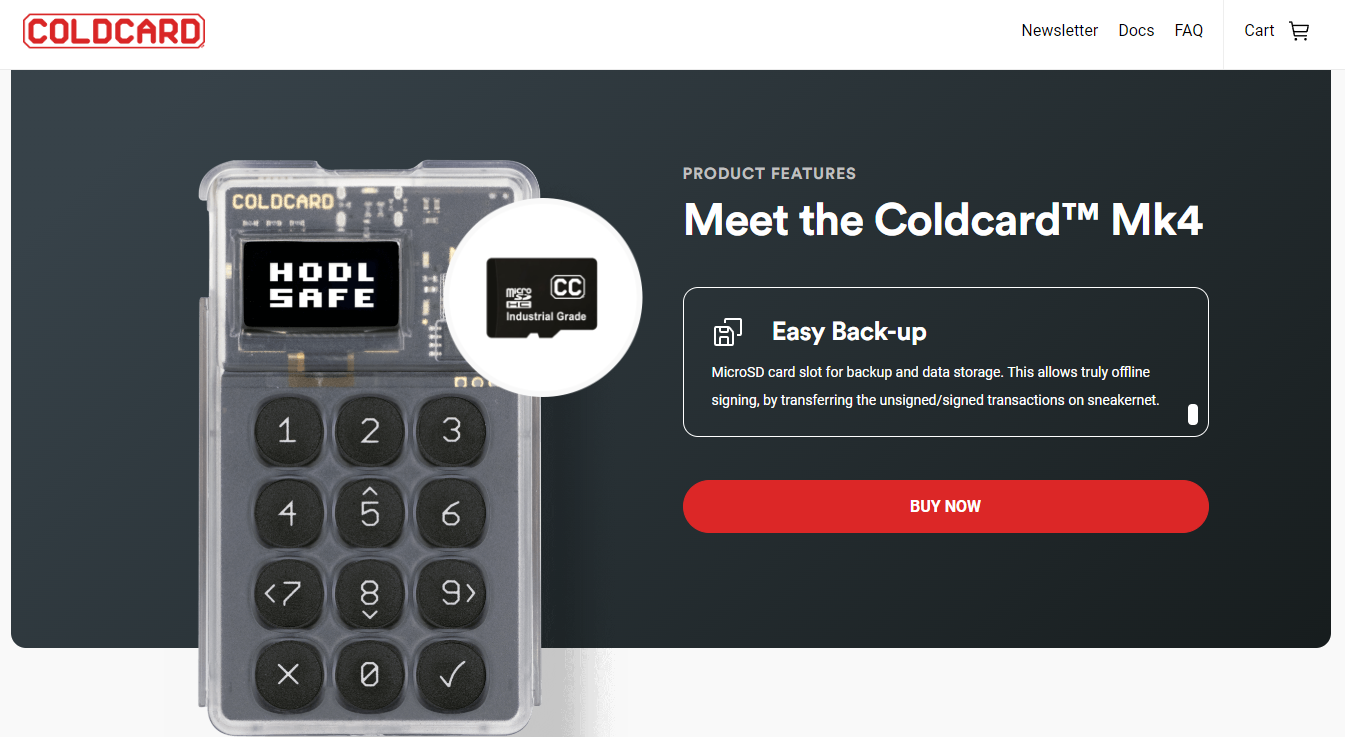
The Coldcard looks like an old school calculator but it is a hardcore air-gapped wallet that is designed for Bitcoin and only Bitcoin.
What makes this device stand out from the competitors is the full size numeric keypad, in addition to the option of being fully air-gapped from wallet generation to transaction signing through microSD interaction.
ColdCard Q
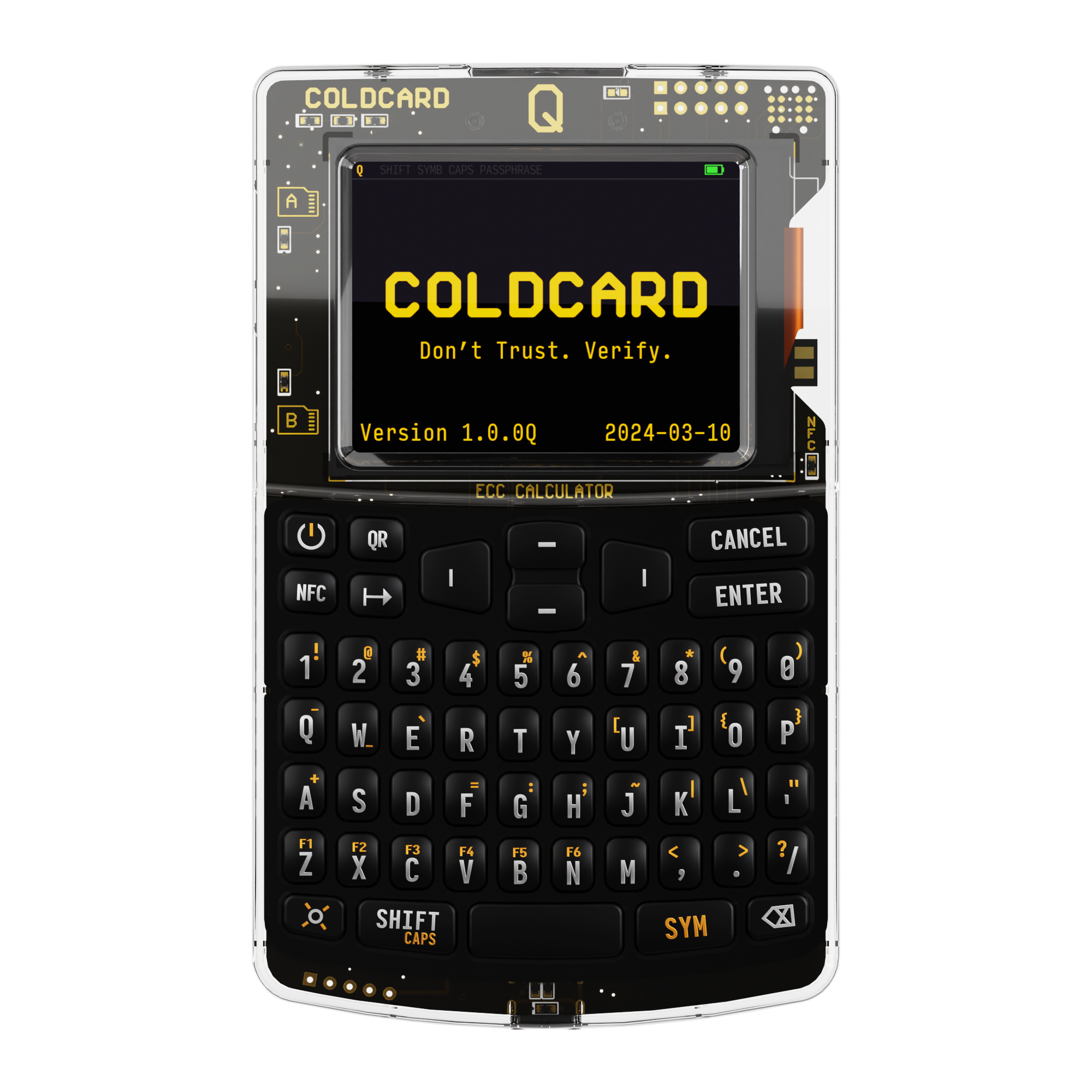
The Coldcard Q is the next evolution of Coinkite’s Bitcoin-only hardware wallets, featuring a full QWERTY keyboard and a large e-ink display for improved usability. It has a design reminiscent of an old-school calculator or PDA and can be configured to boot as a calculator when turned on, only switching to wallet mode when a specific code is entered.
By default, the Coldcard Q is fully air-gapped, supporting transaction signing via microSD cards or NFC, ensuring that private keys never touch an online device. However, for those who prefer a wired connection, it can also be plugged into a computer for direct interaction. The device enhances security with a built-in secure element, advanced passphrase protection, and support for multisig setups, making it an ideal choice for serious Bitcoin users.
Ngrave
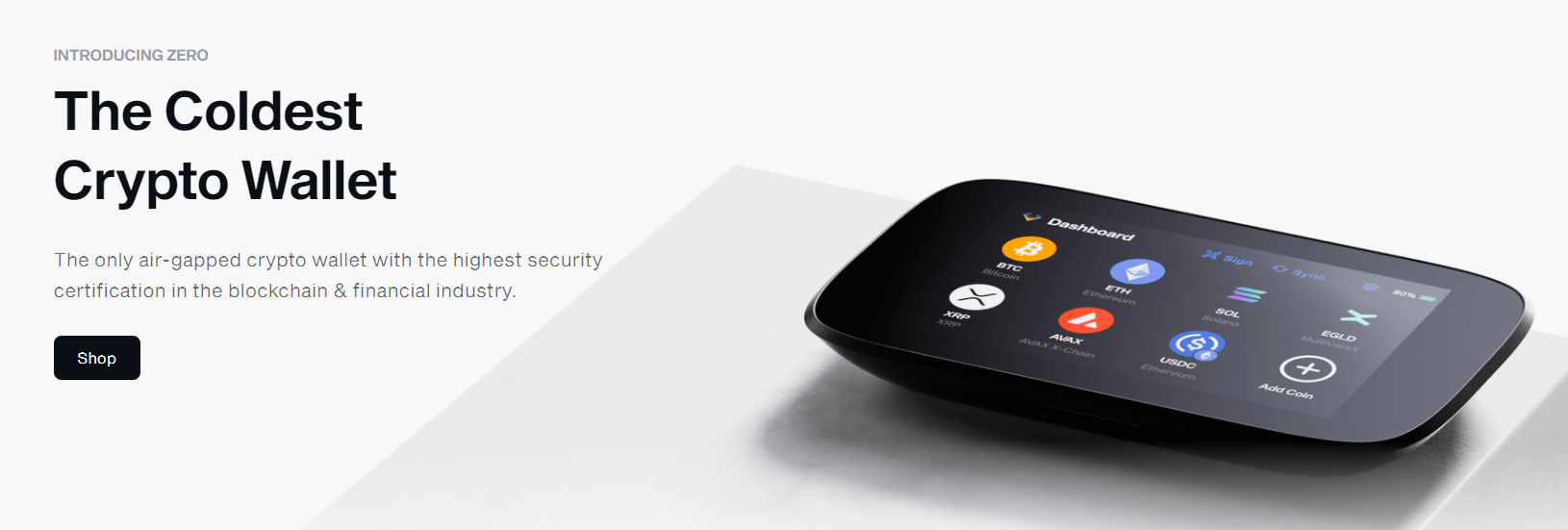
Ngrave is a hardcore tamper proof hardware that is fully air gapped from wallet creation to transaction signing. The device has nearly zero connectivity with no USB, Bluetooth, Wifi nor NFC. All interactions are done through QR codes and for added security, the device features a built-in fingerprint sensor that works in addition to the pin code and the option to create hidden wallets using an additional passphrase.
Passport
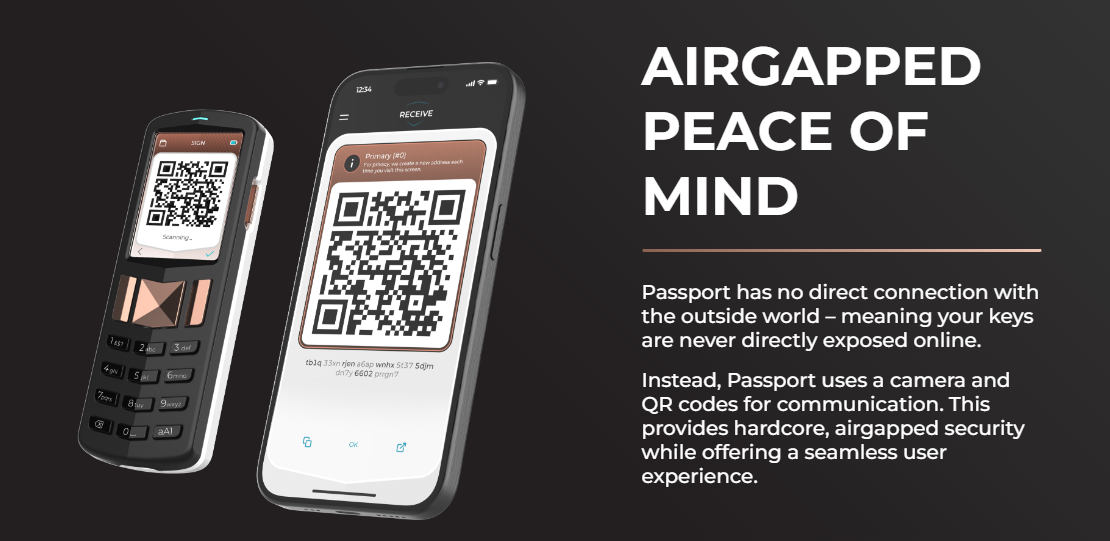
Passport sets a new standard in the world of hardware wallets, offering a sleek, user-friendly interface without compromising on security. It features a high-resolution display, intuitive navigation, and large buttons for all of you out here with fat fingers.
With Passport, you can confidently store, send, and receive Bitcoin, knowing your assets are protected by the latest in cryptographic technology. Designed for comfort and security, Passport is an air gapped device only interacting with the Envoy wallet App through QR codes and uses microSD cards for firmware updates.
Foundation|Passport Prime

The Passport Prime by Foundation Devices is more than a Bitcoin hardware wallet—it's an all-in-one tool for managing digital security. Designed to integrate seamlessly with top Bitcoin wallets like Wasabi Wallet and Sparrow Wallet, Passport Prime offers unmatched versatility and security.
-
Key Features
-
Offline 2FA Management: Stores two-factor authentication codes offline for enhanced account protection.
-
Yubikey Replacement: Acts as a secure alternative, storing security keys for NFC or USB use.
-
Encrypted Storage: Provides 50 GB of encrypted storage for sensitive files.
-
Open Source: Fully transparent design and firmware to ensure user trust.
-
With its Bitcoin-only focus and advanced functionality, Passport Prime sets a new standard for securing digital assets and personal data.
Tangem Ring
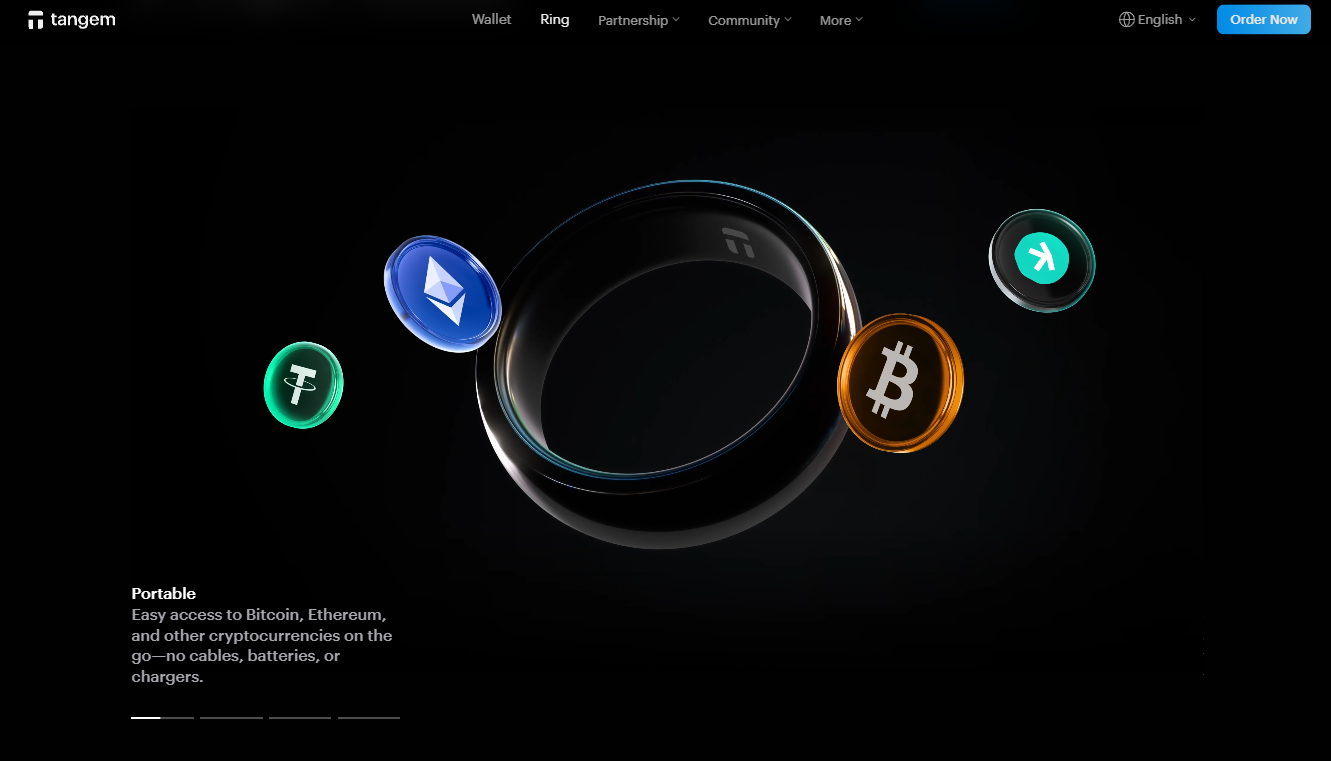
The Tangem Ring Crypto Wallet offers a unique and secure way to store cryptocurrencies. Designed to be worn as a ring, it ensures your private keys stay offline, providing robust protection from online threats. The ring is built with a secure element chip and is resistant to water, dust, and physical tampering.
While the Tangem Ring uses NFC technology for transaction signing, it won’t automatically give access by simply touching it against a device. To authorize a transaction, the ring must be removed from your finger and tapped on a compatible smartphone or device, ensuring an extra layer of security.
In case the ring is lost or stolen, it is nearly impossible for anyone to access your funds without your smartphone. The Tangem Wallet app works in conjunction with the ring, allowing you to securely manage your crypto and make transactions. With no battery required, the ring remains functional at all times.
For users looking for a cold storage solution that’s both portable and secure, the Tangem Ring offers an innovative way to manage digital assets, blending convenience with the highest security standards in crypto wallets.
Safe Seed Phrase Storage
While you may think that any notebook will do, there are many paper and metal options available to safely store your private key or seed phrase:
Ledger Billfodl
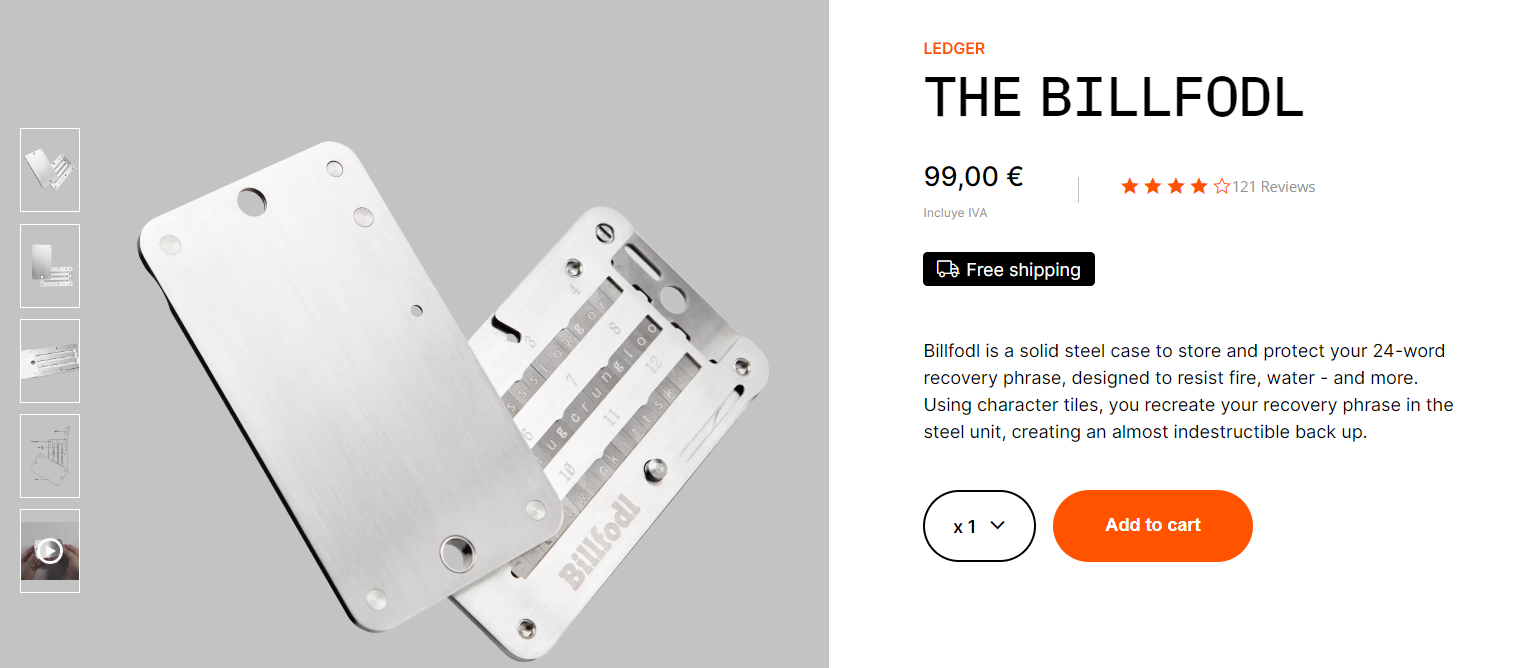
The Billfodl is a device made out of steel that will protect your seed phrase from fire, water and rust. There are many similar options from other manufacturers that you might want to consider but you can also try to make your own if you are any good at DIY for much cheaper.
Keystone Tablet Punch
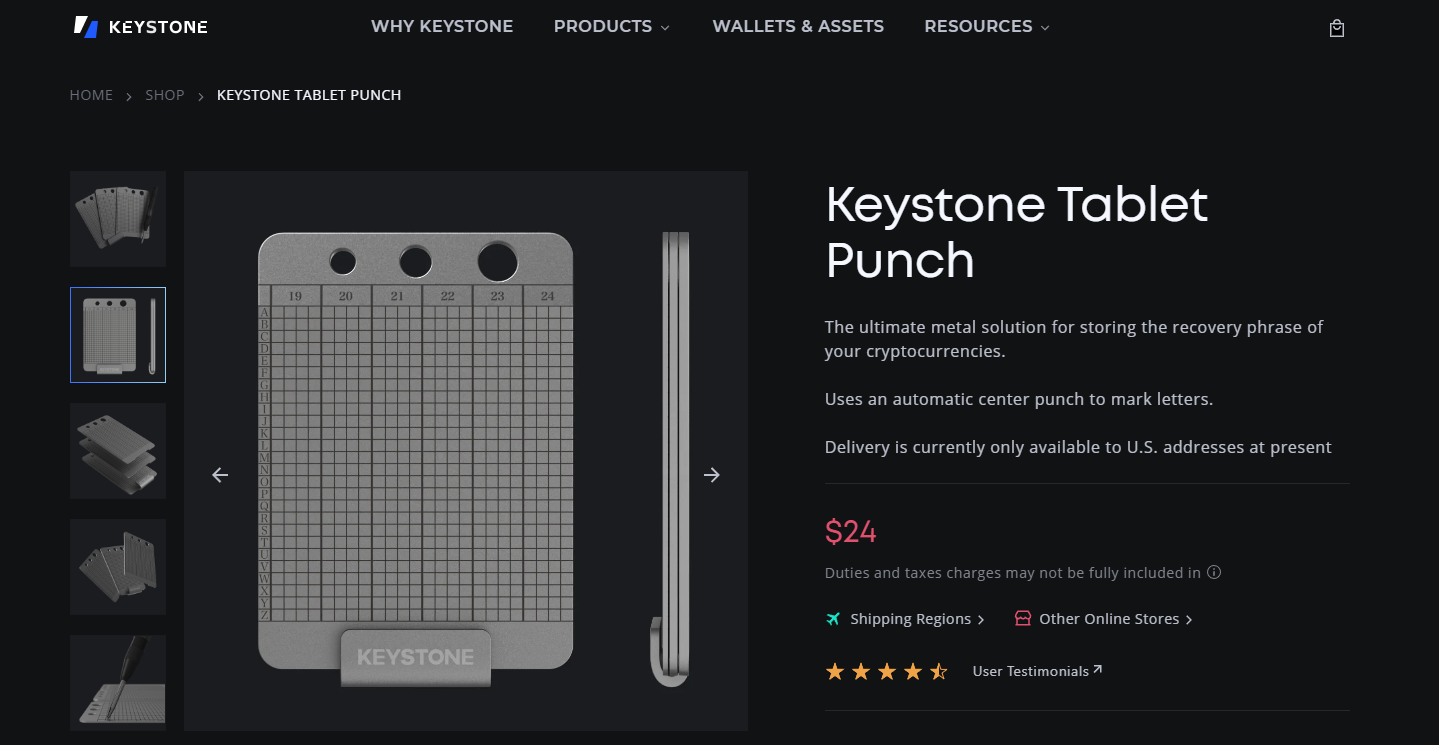
Slightly over $20, the Keystone Tablet is a set of stainless steel plates that come up with a Punch tool to make little holes or dents on the plate.
The tablets have a grid design used to record the first 4 letters of each word (which it claims is enough to figure out the full word) of a 12, 18 or 24 word seed phrase.
COINSURE Capsule
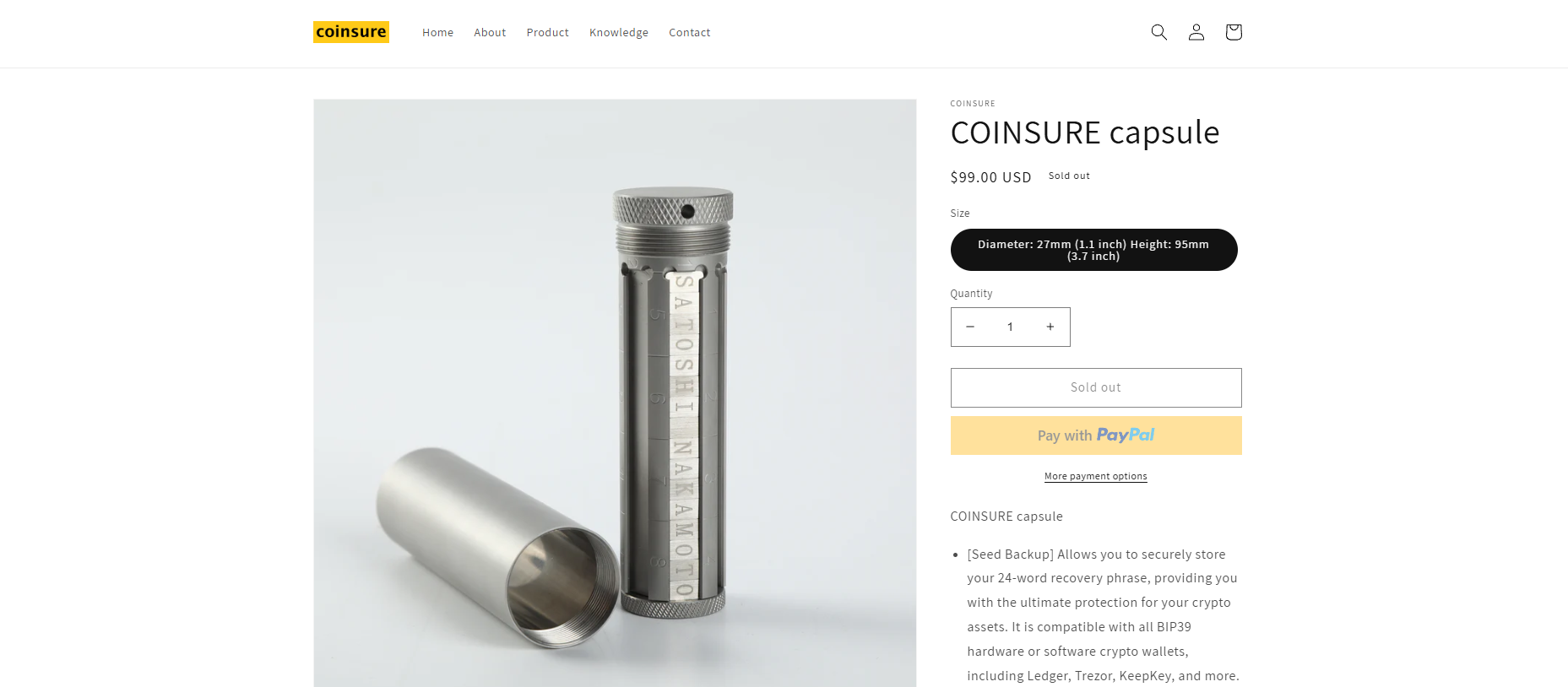
The COINSURE Capsule is a durable, stainless steel solution for securely storing your cryptocurrency seed phrases. Resistant to fire, water, and corrosion, it protects your sensitive information from extreme conditions.
Its compact, cylindrical design allows for discreet storage of a 12, 18, or 24-word seed phrase, either on paper or a metal strip. Built to last for decades, the COINSURE Capsule ensures your seed phrase remains safe and intact, offering peace of mind for long-term crypto holders.
DIY device

If you still prefer to allocate more to buying crypto, instead of overpaying for metal slats, or simply do not want to establish a trail from your bank to any crypto related vendor, you can craft one yourself provided you have the tools required. Keep in mind your device will need to hold through times and potential damage from fire, water or acid, so stainless steel is still your best choice.
Follow JohnChow.com’s guide on how to craft your own seed storing stainless steel device for around $4:
Cryptotag Loki
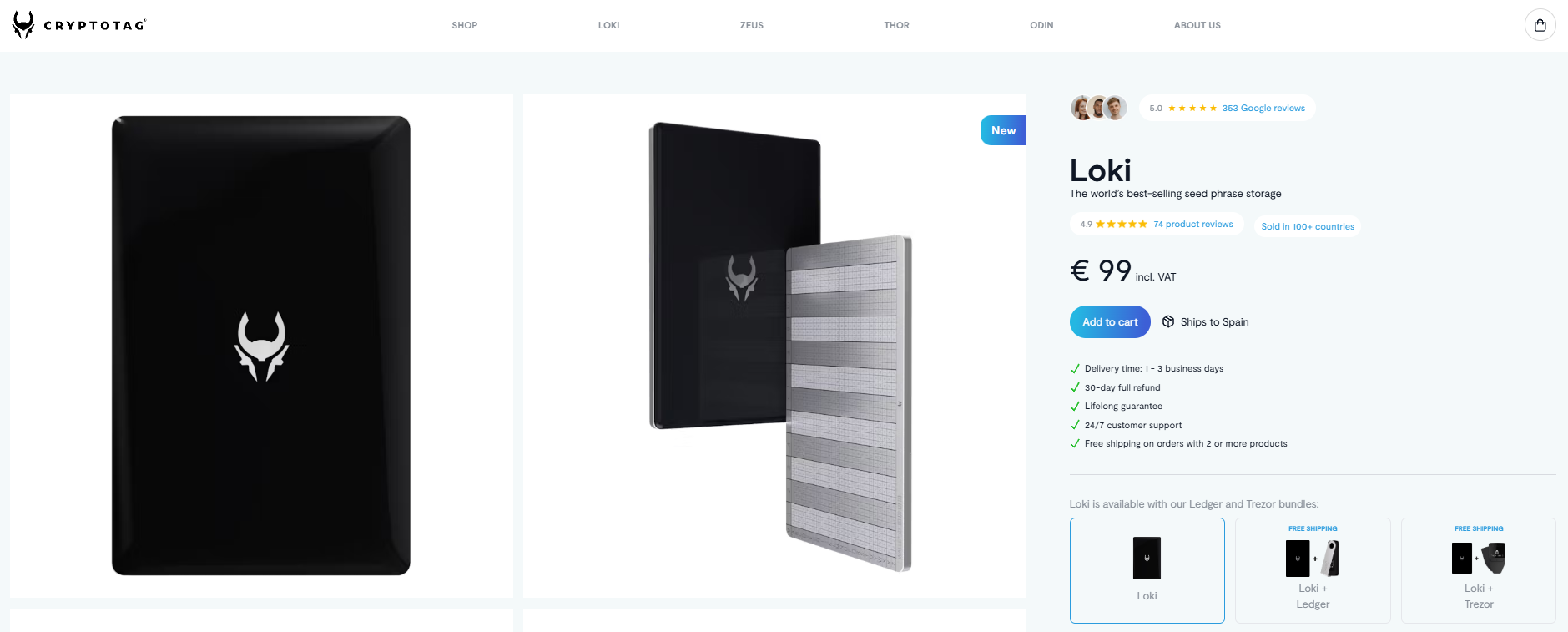
The Cryptotag Loki is a premium-grade titanium seed phrase backup solution designed for those who prioritize extreme durability and anonymity. Forged to withstand fire up to 1665°C, corrosion, and physical damage, the Loki is literally the bulletproof standard of seed backups for the top crypto wallets. Unlike cheaper options, it uses a stamping system instead of manual engraving, offering precision and permanence for securing your seed.
Its rugged and discreet design makes it ideal for users dealing in high-stakes environments, including crypto gambling, or privacy-focused assets like Monero. An excellent choice for anyone serious about secure, anonymous wallet backups.
Shieldfolio Stonebook
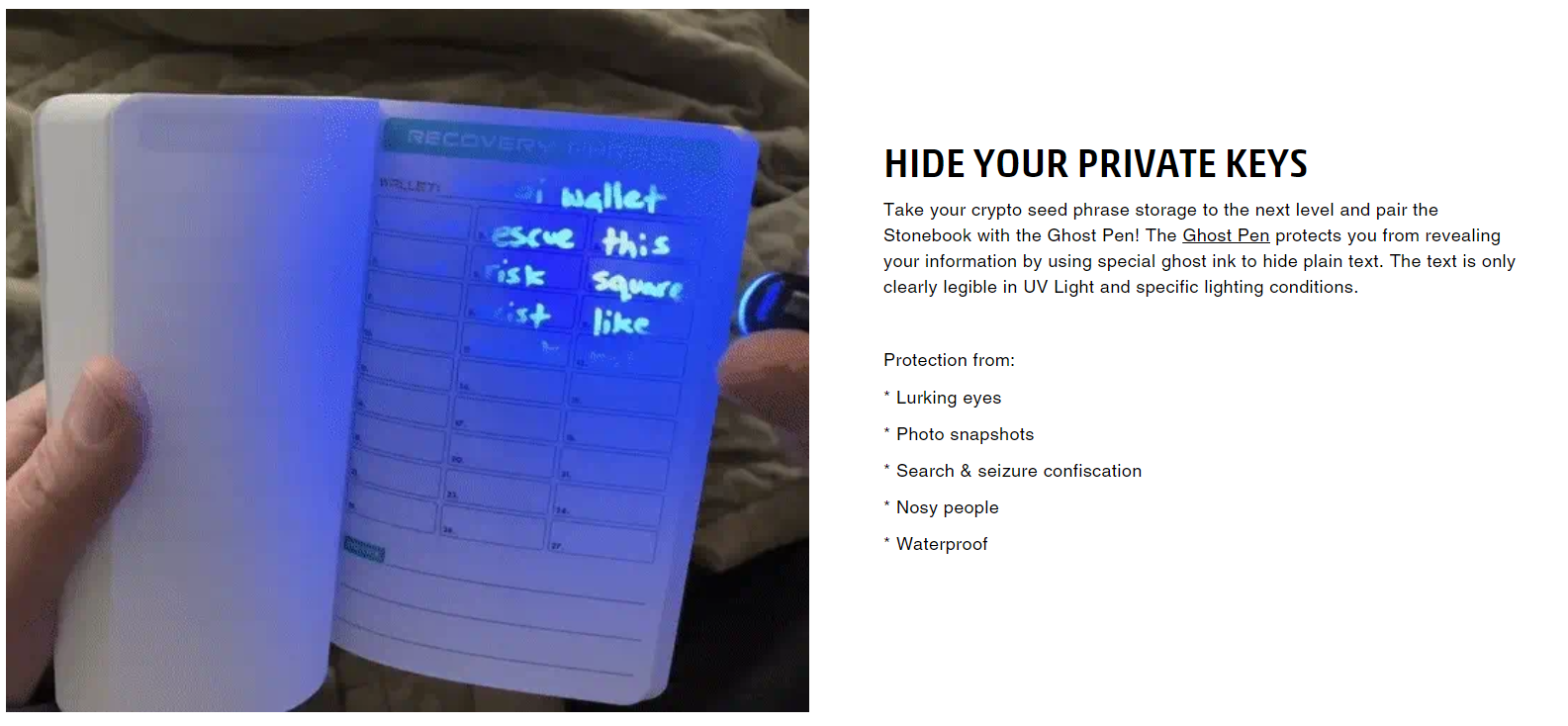
The Stonebook is made out of stone paper, a mixture of limestone/marble waste and resin, which makes it water resistant and tear proof. You can also increase the security by adding the Ghost pen, an invisible ink pen that can only be seen under UV light.
Dangers of Wallets
Crypto wallets and crypto, in general, have a few flaws that could lead to you losing your funds or turning your effort to find anonymity pointless. Here are a few risks of using crypto wallets
User-errors
As crypto wallets give all the responsibility to the holder, user errors can lead to losing access to your wallet and its funds. Some common mistakes that cause users to lose their funds are:
-
Lack of understanding of how crypto works
-
Forgetting passwords/ Mnemonic codes
-
Sending funds to dead addresses
-
Losing their cold wallet
Phishing/Hacks/Scams
Due to the very nature of how cryptocurrencies work, the crypto industry is the most targeted industry when it comes to phishing and hacking attempts. Therefore, it's essential that when using your wallet that you only access reputable websites or put in the research to ensure you're accessing a legit version of the website.
In addition to phishing and hack attempts, the cryptocurrency world is filled with scammers. This could be somebody promising trade and running away with your money or an entire crypto platform that ends up "exit scamming" with all user's funds.
Market volatility
Cryptocurrency is known for its unpredictable markets. Some cryptocurrencies that seemed reputable have fallen to less than 0.1% of their value within a few days. Although this is not specific to crypto wallets, holding your funds in a crypto wallet usually makes it more difficult and adds time to get to the point where you can exchange the cryptocurrency for a fiat currency.
Possible uses
Crypto wallets give the user all the control. This means they can use the wallet as they please.
-
Casinos: Users can use their wallets to deposit funds to different crypto-based casinos. Some wallets, like MetaMask, are imported into the casino UI to make things easier for the user.
-
Payments: The primary reason for the creation of crypto was to make decentralized payments easier. Using a crypto wallet, you can transfer crypto to anybody worldwide, and the funds should appear within a matter of minutes.
-
Investments: In the last few years, crypto has become one of the greatest investments. Using a crypto wallet, you have complete control over your holdings and can store them without trusting any third party to control them.
-
Anonymity: Anonymity is more critical than ever in a world that loves to control people and collect every bit of data as possible. Although there is more to it than just holding a crypto wallet, these are key aspects to ensure your funds and what you do with them remain 100% anonymous.
Pro Tips
When it comes to storing small amounts, using a free hot wallet may suffice. However, for enhanced security and peace of mind, it is highly recommended to invest a few hundred dollars in a hardware wallet and consider a steel or stone paper device to store your seed phrases.
When purchasing a hardware wallet, it is crucial to buy directly from the manufacturer to minimize potential risks. By avoiding intermediaries, you reduce the chances of compromising your sensitive information or getting a compromised device. The 2020 Ledger data breach that leaked 270,000 phone numbers & physical addresses, and 1 million email addresses is proof of the need to take proactive security measures.
To further safeguard your privacy, consider having the hardware wallet shipped to a P.O. Box or an alternate address instead of your home. This additional step can provide an extra layer of protection against potential privacy breaches. By being proactive and mindful of these security measures, you can ensure the safety of your cryptocurrency assets.












